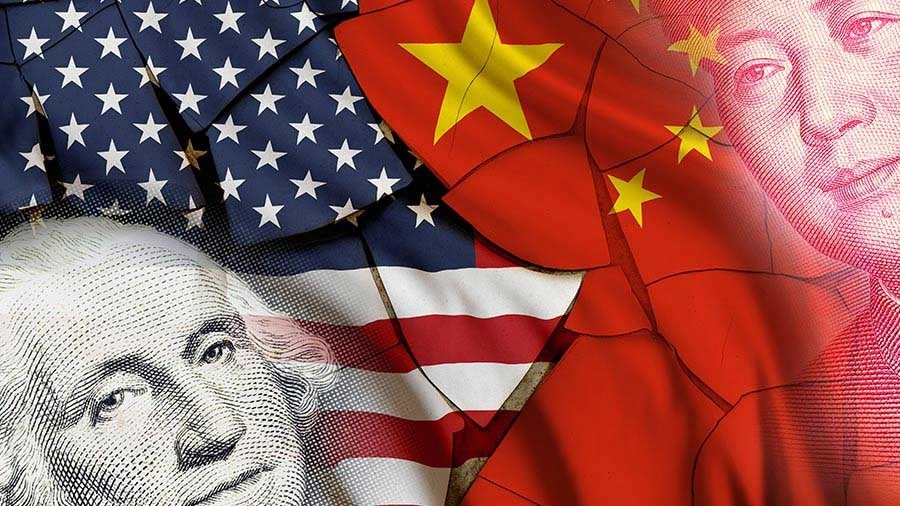
As if economies and markets didn’t already have their hands full, U.S.-China trade tensions have been rekindled. While it’s unlikely a new, full-blown trade war will be unleashed, the two rivals are likely to lock horns over the next few months. This additional layer of uncertainty reinforces our cautious stance toward equities.
By Frederique Carrier, Head of Investment Strategy, RBC Wealth Management
Among the good news that many economies are starting to reopen or preparing to, President Donald Trump’s tough rhetoric toward China about COVID-19 and trade poses additional risks for equity markets. The U.S.-China rivalry, while never gone, had largely fallen off the radar of the corporate sector and investors alike in recent months.
Will it come back in full force like it did during the trade war? We doubt it, though we wouldn’t underestimate the possibility of missteps from either side, which could have serious ramifications at a time when the global economy is particularly weak. We reiterate our message to keep some powder dry.
Turning the heat back up
Following a barrage of statements by top U.S. administration officials about China’s handling of the initial COVID-19 outbreak (and some retorts from Chinese officials), Trump recently observed that China hasn’t lived up to the terms of the January 2020 trade deal with the U.S. This agreement called for a ceasefire in the two-year conflict, and in particular required China to buy $200 billion worth of American goods. Trump fell short of confirming whether he would use tariffs again.
While his statements captured headlines, his administration has taken several other noteworthy steps recently, such as imposing new export controls on technologies with both military and civilian applications, and new restrictions on the import of foreign parts for U.S. power plants and electricity grids so as to diminish security risks to U.S. infrastructure. These moves have largely flown under the radar due to the national emergency caused by COVID-19.
While these trade tensions may yet be defused, we think the direction of the U.S.-China relationship is likely to be toward deterioration. Since the global financial crisis, as U.S. households reduced debt and China focused on domestic consumption and self-sufficiency, the two economic powers have drifted apart. The process has accelerated due to Chinese wages increasing, which has reduced the country’s attractiveness as a source of cheap labor, Trump’s trade war, and now the global pandemic whose first hotspot was in the Chinese city of Wuhan.
Main issue
Policy regarding China will likely become a major issue in the U.S. ahead of the November 2020 presidential election. Historically, U.S. elections have hinged around the economy, and likely will again. But there are always unique “wedge issues” that surface in each election, and we think China will be one of them, with both main presidential candidates competing as to who can sound tougher on China.
A hard line against China seems to have bipartisan support. A Pew Research Center survey conducted in March 2020 suggests that more than 50 percent of Americans have an unfavorable view of China.
Trump is likely to focus on trade and question China’s handling of the COVID-19 virus, while Joe Biden, the presumptive Democratic candidate, will likely focus on other issues where the U.S. perceives China to be committing infractions, such as carbon emissions, cyberattacks, and human rights.
As such, both powers are likely to lock horns over the next few months.
Tariffs in a recession
In an effort to boost his reelection chances, and given the U.S. economy is already suffering due to COVID-19, Trump may try to maximize political advantage over China while minimizing the adverse economic impact on the U.S.
This could come in the guise of sanctions (of which there are already more than 8,000 U.S. sanctions against foreign governments, entities, corporations, and individuals) and/or tariffs.
Imposing tariffs while the domestic economy is growing, as in 2019, is one thing, but to do so when it is contracting is another proposition altogether. Eric Lascelles, RBC Global Asset Management Inc.’s chief economist, already expects a severe 10.6 percent contraction in U.S. GDP in 2020. New tariffs would increase the uncertainty many households and businesses already face. Moreover, such a move could encourage China to retaliate. The 1930s are a case in point. The imposition of significant (approximately 25 percent) tariffs contributed to a recession morphing into the Great Depression.
Not what companies need
While trade tensions never went away, they were engulfed in the tidal wave of COVID-19 newsflow over the past two months. According to Lori Calvasina, RBC Capital Markets, LLC’s head of U.S. equity strategy, the trade war and tariffs were seldom brought up by management teams in the current Q1 2020 earnings season. Throughout 2019, these issues were mentioned by some 40 percent of companies in their quarterly statements. According to Calvasina, the comments accompanying quarterly earnings statements up to early May indicate that most U.S.
Companies, other than those operating in the most distressed sectors, are trying to preserve dividends, at the cost sometimes of suspending share buybacks and cutting capital expenditures, as most see the recession as being transitory. Layering in a rekindled U.S.-China trade conflict and other negatives could be the last straw for a corporate sector already under duress, in her view. There is a limit to how much companies can bend so as not to break.
For the recent stock market rally to be sustainable, in Calvasina’s view, much needs to go right given valuations are stretched and the market seems to be assuming a strong rebound in earnings in 2021.
On balance, we think it is unlikely the Trump administration would willingly unleash a new trade war that would crimp an economic recovery, but the possibility of missteps remains. Should tough U.S.-China rhetoric escalate regarding COVID-19 and trade, bouts of volatility cannot be ruled out. Therefore, we think it is prudent to keep some powder dry, and we would hold a below-benchmark, or Underweight, position in global equities.
Tradersdna is a leading digital and social media platform for traders and investors. Tradersdna offers premiere resources for trading and investing education, digital resources for personal finance, market analysis and free trading guides. More about TradersDNA Features: What Does It Take to Become an Aggressive Trader? | Everything You Need to Know About White Label Trading Software | Advantages of Automated Forex Trading


































